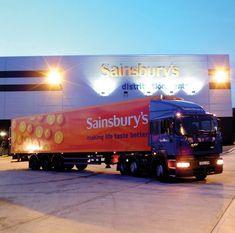
Temperature-controlled technology means that ‘field fresh’ produce is an achievable reality for a growing number of consumers, removing some of the urgency associated with moving certain foods and products.
However, companies that deliver fresh produce don’t always have the luxury of doing so during weekdays and within peak times. For this reason, the concept of night-time deliveries, along with the manifest benefits that only now other sectors are cottoning onto, is nothing new.
Sectors that have not had to make their deliveries out of business hours are slowly finding out that by shifting emphasis onto night-time deliveries, they remove lorries from peak-time congestion, thereby improving local air quality and reducing the transport costs of wasted diesel.
The benefits of going down the out-of-hours delivery route are becoming more widely championed. Paul Clark MP, parliamentary under-secretary of state for transport, recently claimed at an FTA conference: “Quiet out-of-hours deliveries can reduce congestion, cut pollution in local areas and save businesses time and money.” Good news all round then for businesses, residents and the environment.
Unfortunately, it is not quite that simple, as with these convincing benefits comes the very strong perceived threat of anti-social noise pollution. Naturally, residents will shudder at the idea of noisy trucks unloading produce, clanging cages and slamming doors to a backing track of in-cab radios blaring out into the dead of night - it would be a genuine concern for anybody who does not want to add inserting earplugs into their bedtime ritual.
For residents who live close to food markets, restaurants, florists or bakeries, excessive noise can become much more than just an annoyance and studies have shown that it can be very detrimental to one’s health. Indeed, it has been proven that even the risk of heart attack is far greater when exposed to prolonged, loud noise.
However, for distributors and purveyors of fresh produce, the risk of rising the ire and blood pressure of householders need not be an occupational one. In a three-month trial conducted by Sainsbury’s and Wandsworth Borough Council in 2007, it was concluded that if strict procedures, as defined by the FTA and the Noise Abatement Society (NAS), were followed, then the supermarket could save a great deal of money, reduce its carbon footprint and improve the reliability of its supply chain without negatively impacting on people’s quality of life. Crucially, during this trial, no residents complained.
Research already shows that a kneejerk ‘no’ to night-time deliveries is completely unfounded and urban sleep deprivation does not necessarily follow. However, the recently launched Quiet Delivery Demonstration Scheme (QDDS) will provide an even more robust set of data to corroborate with (or, indeed, contradict) the Wandsworth trial.
The FTA, the NAS and the department for transport have invited retailers to participate in quiet delivery trials across the UK. The QDDS will support at least six trials at retail premises across England during 2010, to illustrate the potential benefits of curfew relaxations for quiet deliveries, while still protecting local residents from excessive noise. The aim of the scheme is to make out-of-hours deliveries a feasible and sustainable measure that will attract local authorities across the country and will help the wider adoption of curfew relaxation for quiet deliveries. The concept has certainly sparked a lot of interest, with eight companies across seven local authorities having registered to join.
The QDDS will look at a range of potential measures, including driver and store staff training, quiet vehicle and handling equipment technologies and noise mitigation measures at the point of delivery. The particular measures to be adopted for each site will be decided at local level. These could include anything from common-sense measures like considerate driver and site personnel behaviour, to installing noise mitigation equipment.
Great improvements need not mean great compromise. Neither should they mean great costs. Some of the key solutions and procedures identified by the FTA and the NAS to reduce noise during night-time deliveries include driver and staff training, the use of rubber matting and dock curtains and a strict roll cage, door and radio noise policy - simple yet effective solutions that can make a huge difference. With traffic levels slowly returning to pre-recession levels and local authorities under increasing pressure to alleviate congestion and reduce emissions in their boroughs, night-time deliveries have the potential to blossom.
Although the QDDS has closed, companies interested in finding out more should contact the scheme manager, Chris Douglas, at consultants Transport & Travel Research Ltd via quietdeliveries@ttr-ltd.com